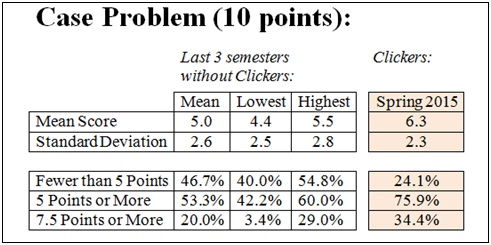PRINT AS PDF
On Friday, May 8, I made a presentation at the Bronx edTech Showcase hosted by Hostos Community College concerning my use of clickers in my BBA 407 Strategic Management class. At that presentation, I noted the value provided from former Associate Online Education Director Alyson Vogel’s partnering in the effort. Alyson is now Senior Instructional Designer at John Jay Online.
Prior to the start of the semester, we discussed issues that included course learning goals and objectives, course content, and student outcomes from past semesters. Concept areas for instruction with clickers were chosen based on persistent student difficulty across semesters.
The conference presentation was based on preliminary data from the Mid-Term Exam. Three areas were examined:
- Student ability to distinguish between entry and exit barriers
- Student understanding of value chain analysis
- Student performance on the case problem, which required the application of multiple course concepts
Unlike in a traditional classroom setting, the use of clickers results in every student’s responding to questions. The class and instructor can view the outcomes in near real-time. Concepts on which students show difficulty can immediately be discussed in greater detail. As a result, students can gain a better understanding of how to address problems and the instructor can gain greater insight into possible barriers to student learning.
The outcomes were promising. In each of the selected areas, students had fared better than they had for the previous three semesters prior to the introduction of clickers. During the prior semester, the value chain had been a focus of enhanced instruction, resulting in the highest percentage of correct answers to date. The use of clickers was followed by an even better outcome.
The following chart highlights student performance on the case problem.
The Mid-Term Exam also contained an embedded survey question concerning the use of clickers. Students unanimously indicated that they believed the use of clickers had facilitated their learning.
At a minimum, favorable student perceptions concerning the use of clickers provide a reason for future use, as a positive classroom experience strengthens student interest and engagement. In turn, increased student interest and engagement has been linked to improved student learning outcomes in the academic literature.
Going forward, the impact of clickers will be examined on the Final Exam. Afterward, clickers will also be utilized next semester to determine whether the early promising results are replicated. The outcomes of this further assessment will shape course content and delivery in succeeding semesters with further assessment of student learning outcomes.



